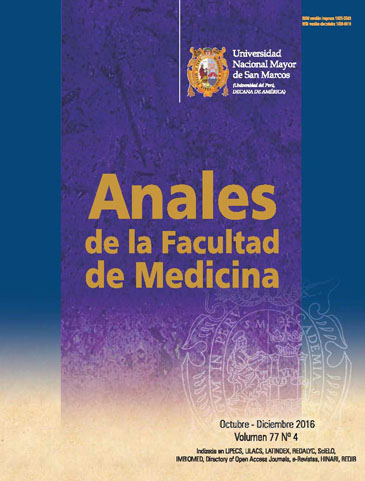Exploratory and factorial analysis of the ‘Questionnaire of psychosocial factors at work’ in Peru
DOI:
https://doi.org/10.15381/anales.v77i4.12649Keywords:
Questionnaire of Psychosocial Factors, Validation, Reliability.Abstract
Introduction. The evaluation of negative psychosocial factors or psychosocial risk factors is a lengthy process, but the majority of methods rely on the use of an instrument or scale, of which we find a wide diversity. However, few have been designed and validated to be applied in Latin America. Objective. To validate an instrument of evaluation of psychosocial factors for its application in workers in Peru. Design. Exploratory factorial analysis of the Questionnaire of Psychosocial Factors at Work with a population of Peruvian workers. Participants. Lima, Arequipa and Trujillo workers. The population consisted in 542 subjects working in construction, textile industry, education services, health, mining, fisheries and agroindustry among others. The statistical analysis was based on the determination of the Cronbach’s alpha coefficient, percentage of variance explained and the eigenvalues of each item of the scale. Results. The Cronbach α coefficient of the questionnaire in general was 0.9, indicating excellent reliability, being above the results of other similar scales. Individually most of the 7 factors of the questionnaire obtained satisfactory values. Those that presented Cronbach’s alpha below 0.7 were ‘Workload’ α = .5, that would qualify as ‘Inadequate’ and ‘Content and characteristics of the task’ with α = .6, qualifying as ‘Adequate but with deficits’. Conclusions. It is possible to use the ‘Questionnaire of Psychosocial Factors at Work’ for the purposes of research and evaluation in companies in Peru.Downloads
Published
2016-12-16
Issue
Section
Artículo Original
License
Copyright (c) 2016 Manuel Pando Moreno

This work is licensed under a Creative Commons Attribution-NonCommercial-ShareAlike 4.0 International License.
Those authors who have publications with this magazine accept the following terms:
- Authors will retain their copyrights and guarantee the journal the right of first publication of their work, which will be simultaneously subject to Creative Commons Attribution License that allows third parties to share the work as long as its author and its first publication this magazine are indicated.
- Authors may adopt other non-exclusive licensing agreements for the distribution of the version of the published work (eg, deposit it in an institutional electronic file or publish it in a monographic volume) provided that the initial publication in this magazine is indicated.
- Authors are allowed and recommended to disseminate their work over the Internet (eg: in institutional telematic archives or on their website) before and during the submission process, which It can produce interesting exchanges and increase quotes from the published work. (See El efecto del acceso abierto ).
How to Cite
1.
Pando Moreno M, Varillas W, Aranda Beltrán C, Elizalde Núñez F. Exploratory and factorial analysis of the ‘Questionnaire of psychosocial factors at work’ in Peru. An Fac med [Internet]. 2016 Dec. 16 [cited 2025 Jun. 7];77(4):365-71. Available from: https://revistasinvestigacion.unmsm.edu.pe/index.php/anales/article/view/12649



